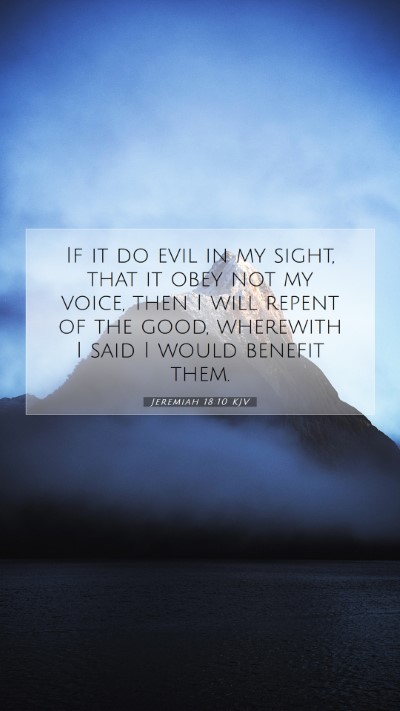Understanding Jeremiah 18:10
Jeremiah 18:10 states, "If it do evil in my sight, that it obey not my voice, then will I repent of the good, wherewith I said I would benefit them." This verse encompasses profound themes of divine sovereignty, human free will, and the conditional nature of God’s promises based on human actions.
Verse Analysis
The context of this verse is pivotal for a comprehensive understanding of its message. The Lord, through Jeremiah, employs the analogy of a potter and clay, illustrating His authority over nations and individuals. The central theme revolves around God’s capacity to change His intentions based on the actions of His people.
Key Interpretations
- Divine Sovereignty: The verse highlights God's ultimate power over creation. As a potter has control over the clay, so does God over nations and their destinies. This reflects His will and governance (Matthew Henry).
- Conditional Promises: The phrase "if it do evil" introduces a condition; God's blessings or judgments are often contingent upon human obedience. This aligns with the theme of covenant relationships prevalent throughout Scripture (Albert Barnes).
- Human Responsibility: The text emphasizes human agency; even though God has a plan, personal and communal actions can lead to a change in divine intentions. This underscores the importance of moral choices (Adam Clarke).
Verse Significance
Understanding Jeremiah 18:10 involves a recognition of its implications for both ancient Israel and contemporary believers. It serves as a reminder of the seriousness of sin and the possibility of divine judgment, but also offers hope for repentance and redemption.
Applications of the Verse
- Moral Reflection: This verse invites believers to reflect on their actions and their alignment with God's will. It prompts a consideration of how individual choices may lead to either favor or judgment.
- Encouragement for Repentance: There is a clear indication that God is willing to alter His plans in response to genuine repentance. This understanding is crucial for those seeking restoration in their relationship with God.
- Understanding God’s Nature: The dynamic nature of God’s relationship with humanity, as depicted in this verse, invites believers to explore deeper theological questions about grace, judgment, and mercy.
Bible Study Insights
For those engaged in Bible study groups or looking for Bible study resources, this verse forms a critical part of understanding the prophetic literature and the broader themes of scripture. It serves as an essential component in Bible study lessons focusing on God's covenant, promises, and the condition of human obedience.
Related Verses
- Exodus 32:14 - God repents of the harm He said He would do to His people.
- 2 Chronicles 7:14 - The call for the people to humble themselves and turn from their wicked ways to receive healing.
- Romans 11:22 - The balance between God’s kindness and severity, highlighting the necessity of continuing in His goodness.
Conclusion
Jeremiah 18:10 serves as an important reminder of the interplay between God’s sovereignty and human responsibility. The knowledge gained from this verse can lead to fruitful discussions in online Bible study or personal Bible study plans, leading believers toward a deeper understanding of Scripture.
This passage can also foster greater insights into understanding difficult Bible passages by showcasing the nuances of God's dealings with humanity, further enriching the study of both Old Testament prophecy interpretations and New Testament themes.


